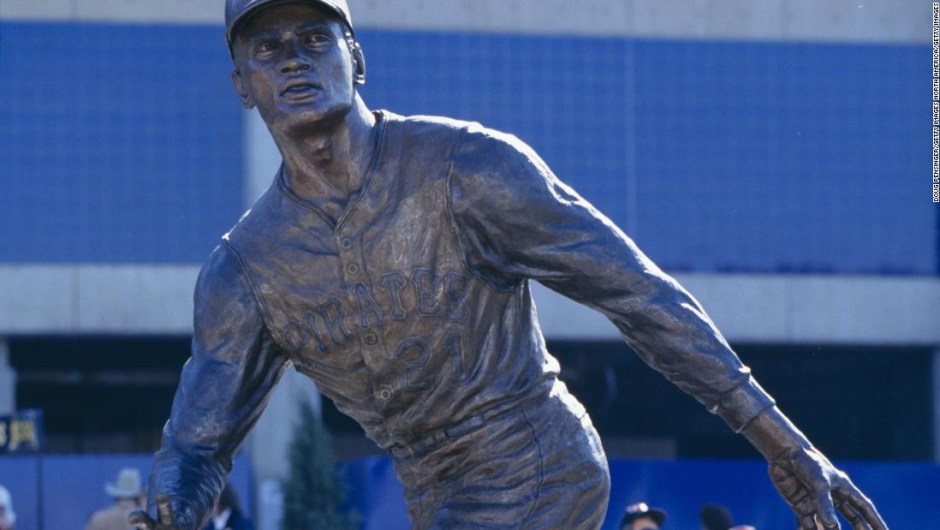Editor's Note:
Ed Morales is a journalist and lecturer at the Center for the Study of Ethnicity and Race at Columbia University and the Craig Newmark Graduate School of Journalism at CUNY.
He is the author of the book «Fantasy Island: Colonialism, Exploitation and the Betrayal of Puerto Rico.
Follow him on Twitter @SpanglishKid.
The opinions expressed are yours.
See more opinion pieces at cnne.com/opinion
(CNN) -
As one of the most physically graceful baseball players, Roberto Clemente was known for his graceful and precise strides in right field, the unerring quick shots of his pitches to catch silly runners who would test his arm, and the crisp line leading from his bat, which earned him a career .317 stellar batting average.
But he was also a civil rights activist and leader.
Clemente's legacy places him alongside the athletes who spoke out during the 1960s and '70s era of America's racial reckoning.
And as the 19th Annual Roberto Clemente Day comes at a time when America is facing an awakening of systemic racism, we must remember that what Clemente did off the field was just as important as what he did on the field.
As a player who faced sharp discrimination from Jim Crow during spring training in Florida with the Pittsburgh Pirates, as well as a good reception in Pittsburgh, Pennsylvania, Clemente had no qualms about reporting the discrimination.
Even until his last interview in October 1972, he spoke about his racial profiling in a New York furniture store, where employees initially refused to show him their best merchandise before discovering who he was.
He also described how he fought the indignity that black players faced, such as when he refused to have food delivered to the team bus because he and his other black teammates couldn't dine with their white teammates in segregated restaurants.
MORE: Baseball Player to Tears: Being a Black Man in America Isn't Easy
Two months later, on New Year's Eve, Clemente died in a plane crash while trying to get humanitarian supplies from his homeland to Nicaragua after a major earthquake.
On Wednesday, all Puerto Rican Major League Baseball players had the opportunity to wear the number 21, commemorating Roberto Clemente's 19th Day.
Players like Yadier Molina of the St. Louis Cardinals and Eddie Rosario of the Minnesota Twins wore it Tuesday because their teams weren't scheduled to play Wednesday.
All of the Pittsburgh Pirates players, including Puerto Rico third base coach Joey Cora, wore it.
The last major league player to wear Clemente's number throughout his career was the Toronto Blue Jays and New York Mets outfielder Carlos Delgado, who was also outspoken, like a proud black Puerto Rican.
Delgado used the number in five of his 17 seasons.
Long before Colin Kaepernick gained national attention by kneeling during the national anthem as a member of the NFL's San Francisco 49ers, Delgado protested the 2003 US invasion of Iraq by standing on the bench while "God Bless America" was played during a 2004 game, causing loud boos at Yankee Stadium.
Delgado recently told the Los Angeles Times that he idolized Clemente's "humanitarianism and willingness to fight for human rights."
He imagined how difficult it must have been for Clemente "to be black in a club with mostly white people, with white reporters constantly teasing you, making fun of your accent."
In this way, Delgado was reminding us of the doubly overwhelming reality of being both a cultural "foreigner" and a black man.
The only time I saw Clemente play in person was as a child at Shea Stadium, with my father, a staunch Yankees fan who constantly gifted me with stories from Puerto Rican players like Orlando Cepeda.
My father saw Cepeda, Clemente, and lesser-known Latino players like Hector López of the Yankees, who was born in Panama, as reflections of his desire to connect his Latino status with his new life in New York City.
But Clemente's legacy has also inspired players from Latin American nations, like the Dominican Republic-born Sammy Sosa, who played for the Chicago Cubs and called Clemente a hero and kept a picture of him on his locker.
In fact, he was a hero and a symbol of talent and integrity.
He became the first Latino to be inducted into the MLB Hall of Fame.
His tragic death made him a martyr, an undisputed hero to Puerto Ricans who aspire to nationality despite their territorial status, and black Latinos whose long-obscured history of double discrimination is rapidly coming to the fore.
In his last interview, Clemente spoke about how inspiring Martin Luther King Jr. was, the change King brought, and the voice he gave to poor black people.
"I grew up with people who really had to fight to live," Clemente said.
Because he never forgot, Clemente dedicated his life to giving them a voice, cementing a legacy that cannot be forgotten.
Roberto Clemente

